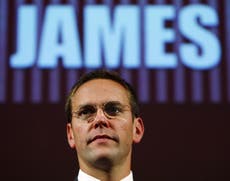No wonder David Attenborough is angry. Climate science has been telling us the same story for decades
Despite more than 30 years of policy, innovation and activism, carbon emissions have risen every year – and with it temperatures. The list of our repeated failures to accept and act is endless
To the surprise of no one who has any interest in climate change, scientific organisations around the world including the Met Office and Nasa, have announced that 2019 was the second warmest year ever recorded by humans. This topped out the 2010s as the warmest decade ever recorded by humans.
There can be absolutely no dispute that the climate is warming, that humans are responsible, and that temperatures are not going to start reducing soon.
As an expert in climate, I have to ask: why is this considered news? We have known for a long time now that temperatures would continue to increase in this manner, because we also knew that we were continuing to pump more carbon dioxide into the Earth’s atmosphere. This increases the atmosphere’s greenhouse gas effect and so trap more heat close to the surface. Yes, there have been some variations in annual surface temperatures; there are hotter years and there are cooler years driven by what we can call natural variability in the climate. But the trend has been clear to see for decades.
No wonder broadcaster and environmentalist David Attenborough is so angry at the response of some politicians to the Australian wildfires outbreak, describing their claims that this event is unrelated to climate change as “palpable nonsense”.
“We have been putting things off for year after year,” Attenborough warned. “This is an urgent problem that has to be solved and, what’s more, we know how to do it – that’s the paradoxical thing, that we’re refusing to take steps that we know have to be taken.” He’s absolutely right.
In 1988, the then Nasa climate scientist, Jim Hansen, explained in a public session of US Congress that the observed increases in global temperature were being driven by increasing concentrations of carbon dioxide in the atmosphere. If this warming continued, he said, it would rise sea levels and threaten to drown coastal cities, it would produce more extreme weather events, and it would risk global and food and water security. In 1992, the Earth Summit in Rio saw the international community come together to both acknowledge these risks and agree effective actions that would halt dangerous human interference in the climate.
And the rest is history.
Because despite more than 30 years of policy, innovation and activism, carbon emissions have risen every year and with it temperatures. The list of our repeated failures to accept and act on what the science is very clearly telling us is endless.
On the day these recent record temperatures were published, the UK Government announced it intended to bail out a national airline that specialises on domestic routes – most of which have viable train alternatives. The UK health minister Mat Hancock defended this decision, claiming that declaring a climate emergency does not mean people have to fly less. How would that work? Electric planes, explained Hancock. But it is somewhat unfair to pick on a single politician for touting unfeasible and impractical technological solutions when, bar a tiny exception, they’re all at it.
The mother of all techno fixes to the climate problem is negative emissions technologies. That most people are unaware of what these are is a scandal. Because if they do not work we are doomed. We have left action on the climate so late that the only way we have any chance of keeping warming to within 2°C is via the deployment of massive infrastructure and tech schemes to suck billions of tons of carbon out of the atmosphere and store it underground indefinitely.
Every now and then a pilot project reports some success. Another paper is published that looks at the suitability of some geological deposit for holding compressed carbon dioxide. But there are currently no feasible plans for how any of these tentative forays into negative emissions will scale up. It’s all based on modelling and scenarios, wishful thinking.
This is exactly the sort of thinking that gives politicians the cover to continue to talk about “effective action” on the climate while doing the exact opposite. They can propose policies that promote economic growth and more environmental impacts, while assuring us that all this mess can be cleaned up quickly and cheaply. What they really propose, however, are policies in which climate change becomes someone else’s problem – global poor and our children and grandchildren specifically, because they are most at risk.
Given trends in emissions, it’s quite likely that the next 10 years will be the warmest decade humans have ever recorded. If that proves to be the case then I doubt it will make headline news. Because in 10 years’ time, the front pages will be dominated by the stories of climate breakdown right across the world.
James Dyke is a senior lecturer and assistant director of the Global Systems Institute at the University of Exeter



Join our commenting forum
Join thought-provoking conversations, follow other Independent readers and see their replies